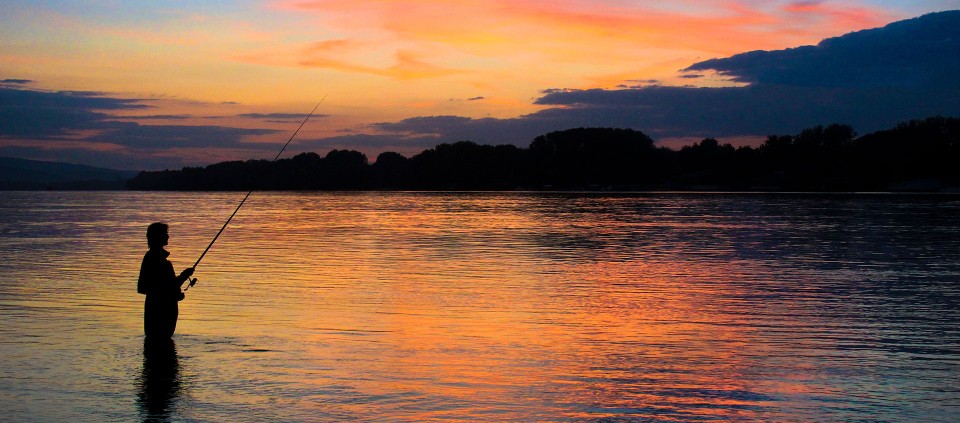The Yoga of Fly-Fishing

Harry Desmond remembers vividly the moment that determined the course of his life. He was in his mid-20s, hiking solo in Yellowstone National Park, where he lived and worked at the time.
“I was way up in this valley in Yellowstone, in the middle of a river, in the middle of the mountains, all by myself,” he recalls. “The sun was going down and I was surrounded by caddisflies, which look like mini moths. There were literally tens of thousands of them in the air, and the sun was hitting them and it looked like sparkling dust in the air all around me. It was so surreal and so beyond beautiful that I just stood there and couldn’t believe what I was part of. In that moment, I knew this was how I was going to live the rest of my life.”
Since then, Harry has spent a good part of most every day (yes, even in winter) in or on the water. After nearly a decade at Yellowstone, he went to Montana to attend Sweetwater Fly Fishing Guide School, and eventually returned to his hometown of Lee, Massachusetts, where he founded Berkshire Rivers Fly Fishing™, guiding tours throughout the region. The Berkshire area is ideal, he says, because “you literally could be in the middle of nowhere fishing in some really beautiful location and the next minute you could be at Kripalu, or Jacob’s Pillow, or on the Tanglewood lawn listening to the Boston Pops. It’s a unique combination of nature and culture—the options are just awesome.”
This summer, Harry teaches the new Kripalu program Fly-Fishing and Mindfulness Weekend, in which participants will learn and practice the skills associated with the sport, including casting, knot tying and fly making, river conservation, and mindful observation. (While the group won’t go out on the water during the program, Harry is offering a 10 percent discount for participants for a Berkshire Rivers Fly Fishing tour.)
Fly-fishing wasn’t Harry’s first passion; he was a serious hiker and rock climber first, and picked up the sport as a hobby. What he grew to love about it was the places it brought him, he says—“rivers I wouldn’t normally explore, floating on a boat to someplace I’d never been.”
The sport is catching on with new audiences, he says—in particular, women and millennials, many of whom fell in love with both Brad Pitt and fly-fishing after watching the 1992 film A River Runs Through It. About 30 percent of the 6.5 million Americans who fly-fish are women, and at a recent tournament Harry attended in Tennessee, seeking the elusive muskie, the median age was around 30. He likens the growing popularity of fly-fishing over the past decade to the snowboarding boom before that: It’s been around for ages, but with the help of the internet and trendy gear, it’s become cool.
“There’s way more information out there, and it’s easier to learn online with videos than books,” he notes. “Before, it was old guys fishing for trout in the mountains; now it’s kids going into tne Amazon and chasing something that’s never been chased before.”
But for Harry, fly-fishing is less of a hunt and more of a meditation. “When I was younger, I didn’t know what I was feeling when I came off the river, but I knew that I felt different and a lot clearer. When you’re out there watching the universe in its daily rhythm, you can really see how everything is interconnected.”
Here are six practices for getting the most out of fly-fishing—and life.
Watch and listen. Fly-fishing requires deep study of your surroundings, including weather and temperature, barometric pressure, solar and lunar cycles, humidity and wind. “To catch a fish, you need to listen to what’s going on around you and what the day is telling you to do,” Harry says. “There are subtle clues that let you know where the fish might be—the birds, the shadows, the bubbles that oxygen makes in the water.”
Improvise. Flexibility is essential when you’re on the lookout for fish. “It’s never the same on the water from day to day, or hour to hour, because the earth is always doing something a little different,” Harry says. Be prepared to come up with a new game plan at any moment.
Find your rhythm. Casting, an essential fly-fishing skill, depends on rhythm and cadence. It’s not about physical strength or endurance, Harry says, as much as patience and focus—getting in the zone so that your mind and your muscles are in perfect sync.
Flow with the changes. “The fishing community talks about an imaginary bubble on a river on any given day,” Harry explains. “Inside that bubble are the optimal conditions for fly-fishing, and that bubble is always moving. The idea is to be moving along with it.”
Practice nonattachment (aka catch and release). In more than 20 years of fly-fishing, Harry has never kept a single fish. “You spend so much time understanding the world that’s in front of you and how it’s unfolding, you put so much effort and love into that, that once you finally do catch this beautiful being, the last thing you want to do is take it out of the river.”
Be present. “Ultimately, the biggest thing the sport has helped me realize is that you only live once, and there’s nothing more important than the moment,” Harry says. “With fly-fishing, you have to be in the moment, and if we could do that with everything we do in life—on the water, in the grocery store, dealing with family, everyday stuff—we’d be way more fulfilled.”
Find out more about Harry Desmond's Fly-Fishing and Mindfulness Weekend at Kripalu.
© Kripalu Center for Yoga & Health. All rights reserved. To request permission to reprint, please email editor@kripalu.org.